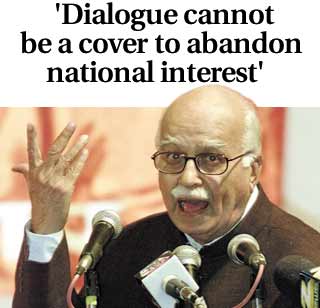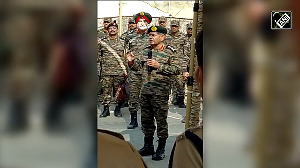
As the peace process between India and Pakistan moves ahead under Prime Minister Atal Bihari Vajpayee's leadership, Deputy Prime Minister L K Advani is currently on a crucial visit to the United States.
Political pundits believe the combination of Vajpayee's political shrewdness and Advani's conviction can greatly strengthen India's commitment to peace, which is precisely what America is looking for.
A week before his trip to Washington, Advani spoke at length to Senior Editor Sheela Bhatt about his expectations from his US visit and India's peace initiative. The first of a three-part interview:
Most experts say the importance of Advani's visit to America is that he is seen as the prime minister-in-waiting.
I don't attach any importance to it because even today I am a participant in policy making.
Many experts believe America will try to understand the views of the man who is considered hawkish on the Indo-Pak peace initiative.
Is America hawkish in respect to Afghanistan? Why is it that people who advise us to hold a dialogue with our adversary are themselves never keen to hold dialogue with anyone?
Why is it so?
Because dialogue cannot be a cover to abandon the country's national interest. So far as India is concerned, India does not have to prove its credentials that it is a peace loving country. People as well as the government. Often, the government in New Delhi today has been regarded as the most hawkish Indian government.
This attempt to differentiate between Vajpayee and Advani is pointless. Not a single major step taken in the last five years has been without the consent of both, practically. Though I would accept whatever my prime minister says because he is my leader. So much so I can say that when after Kargil Mr Vajpayee invited Pervez Musharraf to come to Agra, it was mainly at my persuasion. I said it doesn't matter if we don't know him. He is an army leader, he may be different from other political leaders we have seen. Let's try him. What do we lose? He [Vajpayee] had just undertaken a bus trip to Lahore, he didn't succeed.
We shall try again. We may not succeed, but it will underscore India's own desire for peace. That this government is keen to see that we don't leave behind a continuing legacy of confrontation and war as we have seen in last 55 years, for the coming generations.
Why was there no peace between India and Pakistan for 55 years? Our government has been in power only in the last five years. Those who are trying to find differences between me and Vajpayee are not being fair.
Media reports mentioned that the latest peace initiative was a unilateral Vajpayee decision and the external affairs ministry was in the dark. One Indian newspaper said you and Defence Minister George Fernandes differed with Vajpayee at the Cabinet Committee on Security meeting.
Absolutely absurd story. So far as the CCS is concerned I have not had a single meeting till today in which there has been a difference. But that apart, you see the PM said something at the public meeting at Srinagar. He said 'Hum to aaj bhi haath milane ko taiyar hai. [India is ready to extend a hand of friendship even today.] Then he came back to New Delhi. Then there was occasion for a formal statement, which he made before the press.
There was a reiteration that India wants peace, but how can peace come about unless there is a conducive atmosphere for talks? And that cannot come about unless infiltration is stopped; the infrastructure of terrorism is dismantled. This is exactly what he repeated in both Houses of Parliament.
But the first statement at the public meeting, naturally, had its own impact. It's a good thing. Now some people say that was a tactic. I don't think it was tactical. It only emphasised that innately India wants peace. When Mr [Mir Zafarullah Khan] Jamali said let not India think we are going to abandon our stand on Kashmir. I said [in a public statement], I don't expect you to abandon your stand on Kashmir. I said the same thing to General Musharraf when I first met him in New Delhi.
I told him, apart from my opening observations: "General, you have come to India. On Kashmir we happen to have diametrically different viewpoints. I swear by the Indian Constitution which tells me that not only Jammu, Kashmir and Ladakh but even Pakistan occupied Kashmir and even the area that has been ceded to China by Pakistan are part of the Jammu and Kashmir state. We swear allegiance to the Constitution. Can I compromise on this? Can I?"
Similarly I can view it from your [General Musharraf's] point of view. Pakistan was created on the basis of religious demography. Where there was a majority of Muslims and where there was a majority of Hindus was taken into consideration. India's Partition was based on this kind of religious demography. People in Pakistan hold that after all J&K was a Muslim majority state. Out of all princely states this was a one state with a clear Muslim majority. How did it go to India?
Pakistanis do not remember that the demographic division on the basis of religion was confined to British India. All the states were given the option to accede either to Pakistan or to India. All the 500 states did it that way. Jammu and Kashmir too did it the same way. But the prime minister of India [Jawaharlal Nehru] was not satisfied. He said, "So far as J&K is concerned, because it's a state with a Muslim majority I would like the people of J&K to decide."
Then the National Conference, the sole representative body of the Muslims of J&K at that time, decided in favour of India. After the Constituent Assembly of J&K decided, J&K was accepted into the Union of India. It is not our fault.
Historically, constitutionally and legally, J&K became part of India. In 1947 it was Pakistan which attacked India. Of course, I didn't mention all these facts to General Musharraf. I simply mentioned what I believe in and what he believes in about Kashmir.
How can these difference be resolved? I told General Musharraf that it could be resolved only in one way. You maintain your stand on Kashmir, I maintain my stand on Kashmir. But tomorrow, in Agra, let us pledge that peace cannot be held hostage to the resolution of these differences. There shall be no violence. There shall be no war. Either overt or covert. This is the decision and pledge we had to take in Agra tomorrow.
Part II and III of the Advani interview





